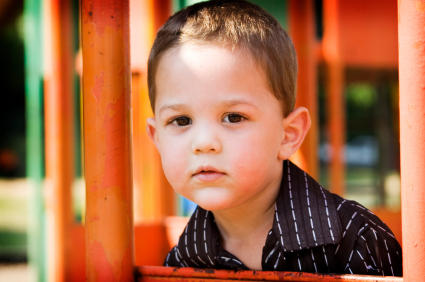Bullying of Children with Food Allergies - How You Can Help
by Karen Stickler, PsyD, MA
If nearly 35 percent of children aged 5 and older with food allergies are bullied[1], how can we prepare our children and keep them safe?
Bullying is common among children with food allergies, and is associated with lower quality of life and distress in children and their parents. Bullying victims can be at increased risk for suicide. In addition, bullying of children with food allergies using food allergens can result in potentially life-threatening allergic reactions.[2] As parents, teachers, and medical professionals, it is our obligation to help our children navigate through the joys and perils of life. Above all else, we want to keep our children safe. Bullying, therefore, should not be tolerated under any circumstances.
Together we can -and should - proactively advocate to prevent, and to swiftly deal with bullying of our children. There are ways to be proactive in dealing with bullying A few ways in which you can help include talking about bullying; describing ways in which one may be bullied; working on a safety plan with your child; and familiarizing yourself with the signs and symptoms of bullying.
Talking about Bullying with Your Child
What exactly is bullying? Definitions of bullying vary; one definition by StopBullying.gov, defines bullying as “unwanted, aggressive behavior among school aged children that involves a real or perceived power imbalance. The behavior is repeated, or has the potential to be repeated, over time.”[3] Long before your child may become the victim of bullying, it's important to talk with him about it. When talking to your child, you will need to use age appropriate language to explain what bullying is.

You will also need to explain why children with food allergies may be at risk for bullying. Oftentimes, kids are bullied when they are perceived as different from their peers. Living with food allergies differentiates children from the ‘norm’ and immediately puts kids at risk for being bullied. This may or may not be true given how the community (school, religious institutions, sports, and other recreational groups) perceives food allergies and whether or not they understand the real physical reactions one can have to the allergen(s).
For children with food allergies, bullying may take on a new dimension. It has been reported that some children have been taunted by other children using allergens, such as touching the allergic child with the known allergen, contaminating their food, or throwing the allergen at them.[1] Let your children know that these behaviors are not acceptable, and shouldn't be tolerated. Validate their feelings and experiences, and teach them to inform an adult who can intervene.
Working out a Safety Plan with Your Child
Parents and educators alike can teach children about developing a safety plan which should include who they are going to inform about the bullying, how they will stay safe physically, and ways in which they can express their feelings. Safety plans should be communicated to teachers, school administrators, health nurses, co-workers and others who come in contact with your children on a daily basis. As a reminder, it is imperative that younger children understand which food(s) they are allergic to and the reactions they may experience. Use this conversation as another opportunity to talk about when an epinephrine autoinjector might be used. Let them know that other adults, (i.e. teachers, coaches, other relatives, and babysitters) are aware of their action plan as well.
Familiarizing Yourself with the Signs and Symptoms of Bullying
You should become acquainted with the signs and symptoms of bullying and ask your child directly if you suspect he's been bullied.
Some of the more common symptoms of bullying can include unexplainable injuries, lost or destroyed personal belongings, changes in eating or sleep habits, not wanting to go to school, a decline in grades, a sudden loss in friends and feelings of helplessness.[4]
If you are concerned about your child’s well-being and believe they need professional help, contact your allergist, pediatrician, school counselor, or Kids With Food Allergies (www.kidswithfoodallergies.org) for appropriate referrals.
 Dr. Karen Stickler is a Licensed Clinical Psychologist in Chicago, IL. Her main area of focus is weight management and obesity/bariatrics and she provides pre-surgical assessment and post-operative support to individuals pursuing weight loss surgery. Additionally, she works with clients who are living with and managing other chronic medical conditions. Her services include psychological testing, clinical interviews, psycho-education, post-operative support groups and individual and/or couples therapy.
Dr. Karen Stickler is a Licensed Clinical Psychologist in Chicago, IL. Her main area of focus is weight management and obesity/bariatrics and she provides pre-surgical assessment and post-operative support to individuals pursuing weight loss surgery. Additionally, she works with clients who are living with and managing other chronic medical conditions. Her services include psychological testing, clinical interviews, psycho-education, post-operative support groups and individual and/or couples therapy.
Dr. Stickler is on the Medical Advisory Team for Kids with Food Allergies due to her strong interest in the field. She herself was diagnosed with food allergies as a child and has a personal understanding of the daily challenges that present itself to children and families living with food allergies. Additionally, she is a board member of Jewish Child and Family Services in Chicago, IL.
[1] Lieberman JA, Weiss C, Furlong TJ, Sicherer M, Sicherer, SH. Bullying among pediatric patients with food allergy. Ann Allergy Asthma Immunol. 2010:105(4): 282-286.
[2] Child and Parental Reports of Bullying in a Consecutive Sample of Children With Food Allergy. Annunziato RA, Ambrose MA, Ravid NL, Mullarkey C, Rubes, M, Chuang K, Sicherer M, Sicherer, SH. Pediatrics peds.2012-1180; published ahead of print December 24, 2012, doi:10.1542/peds.2012-1180. Retrieved January 28, 2013 from http://pediatrics.aappublicati...2-1180.full.pdf+html
[3] U.S. Department of Health & Human Services (no date). Retrieved January 28, 2013 from http://www.stopbullying.gov/wh...efinition/index.html.
[4] U.S. Department of Health & Human Services (no date). Retrieved January 28, 2013 from http://www.stopbullying.gov/get-help-now/index.html



Comments (2)